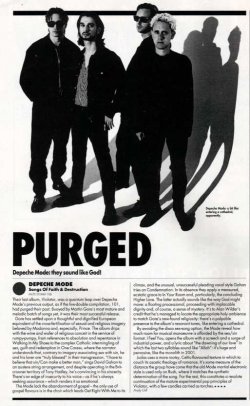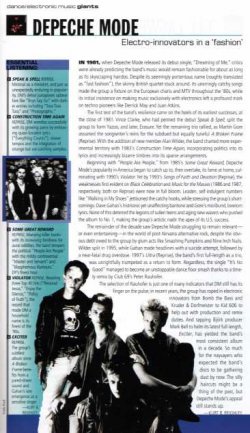- Joined
- Aug 15, 2019
- Messages
- 7,493
- Reaction score
- 143
- Points
- 63
Purged
[Q, April 1993. Words: Andy Gill. Picture: Anton Corbijn.]

Their last album, Violator, was a quantum leap over Depeche Mode's previous output, as if the live double-compilation, 101, had purged their past. Buoyed by Martin Gore's most mature and melodic batch of songs yet, it was their most successful release.
Gore has settled upon a thoughtful and dignified European equivalent of the cross-fertilisation of sexual and religious imagery beloved by Madonna and, especially, Prince. The album drips with the wine and wafer of religious conceit in the service of rumpy-pumpy, from references to absolution and repentance in Walking In My Shoes to the complex Catholic intermingling of sex, guilt and redemption in One Caress, where the narrator understands that, contrary to imagery associating sex with sin, he and his lover are 'truly blessed' in their transgression. "I have to believe that sin / Can make a better man," sings David Gahan [1] to an austere string arrangement, and despite operating in the Brit-crooner territory of Tony Hadley, he's convincing in his sincerity. There's an edge of insecurity to his voice - as if he's always seeking assurance - which renders it so emotional.
The Mode lack the abandonment of gospel - the only use of gospel flavours is in the choir which leads Get Right With Me to its climax, and the unusual, unsuccessful vocal style Gahan tries on Condemnation. In its absence they apply measured, ecstatic grace to In Your Room and, particularly, the concluding Higher Love. The latter actually sounds like the way God might move: a floating processional, proceeding with implacable dignity and, of course, a sense of mystery. It's to Alan Wilder's credit that he's managed to locate the appropriate holy ambience to match Gore's new-found religiosity: there's a palpable presence to the album's resonant tones, like entering a cathedral. [2]
By avoiding the disco sex-song option, the Mode reveal how much room for musical maneuvre is afforded by the sex/sin format. I Feel You, opens the album with a screech and surge of industrial power, and a lyric about "the dawning of our love" in which the last two syllable sound like 'Allah': it's huge and pervasive, like the monolith in 2001.
Judas uses a more rootsy, Celtic-flavoured texture in which to couch its ascetic theology of romance. It's some measure of the distance the group have come that the old Mode martial electronic style is used only on Rush, where it matches the synthetic determination of the song. For the rest, this constitutes a resolute continuation of the mature experimental pop principles of Violator, with a few candles carried as torches. ****
[Q, April 1993. Words: Andy Gill. Picture: Anton Corbijn.]
The author waxes lyrical about the religious imagery in this generally glowing review of Songs Of Faith and Devotion, in which every song except Mercy In You gets a mention.
" [Higher Love] actually sounds like the way God might move: a floating processional, proceeding with implacable dignity and, of course, a sense of mystery."

Their last album, Violator, was a quantum leap over Depeche Mode's previous output, as if the live double-compilation, 101, had purged their past. Buoyed by Martin Gore's most mature and melodic batch of songs yet, it was their most successful release.
Gore has settled upon a thoughtful and dignified European equivalent of the cross-fertilisation of sexual and religious imagery beloved by Madonna and, especially, Prince. The album drips with the wine and wafer of religious conceit in the service of rumpy-pumpy, from references to absolution and repentance in Walking In My Shoes to the complex Catholic intermingling of sex, guilt and redemption in One Caress, where the narrator understands that, contrary to imagery associating sex with sin, he and his lover are 'truly blessed' in their transgression. "I have to believe that sin / Can make a better man," sings David Gahan [1] to an austere string arrangement, and despite operating in the Brit-crooner territory of Tony Hadley, he's convincing in his sincerity. There's an edge of insecurity to his voice - as if he's always seeking assurance - which renders it so emotional.
The Mode lack the abandonment of gospel - the only use of gospel flavours is in the choir which leads Get Right With Me to its climax, and the unusual, unsuccessful vocal style Gahan tries on Condemnation. In its absence they apply measured, ecstatic grace to In Your Room and, particularly, the concluding Higher Love. The latter actually sounds like the way God might move: a floating processional, proceeding with implacable dignity and, of course, a sense of mystery. It's to Alan Wilder's credit that he's managed to locate the appropriate holy ambience to match Gore's new-found religiosity: there's a palpable presence to the album's resonant tones, like entering a cathedral. [2]
By avoiding the disco sex-song option, the Mode reveal how much room for musical maneuvre is afforded by the sex/sin format. I Feel You, opens the album with a screech and surge of industrial power, and a lyric about "the dawning of our love" in which the last two syllable sound like 'Allah': it's huge and pervasive, like the monolith in 2001.
Judas uses a more rootsy, Celtic-flavoured texture in which to couch its ascetic theology of romance. It's some measure of the distance the group have come that the old Mode martial electronic style is used only on Rush, where it matches the synthetic determination of the song. For the rest, this constitutes a resolute continuation of the mature experimental pop principles of Violator, with a few candles carried as torches. ****
[1] - One Caress, like Judas, is actually sung by Martin.
[2] - Before you get too carried away, here's a review by a writer left distinctly cold by the feel of the album.

Depeche Mode: Electro-Innovators in a "Fashion" (Tower Guide to Dance and Electronic Music, 2001)
Depeche Mode: Electro-Innovators in a "Fashion" [From "Tower Guide to Dance and Electronic Music", Tower Records, 2001. Words: Kurt B. Reighley. Pictures: Sheila Rock / Anton Corbijn.] Summary of the band in a US music store freebie. While the author does a pretty good job of fitting the band's...dmremix.pro
Last edited:
